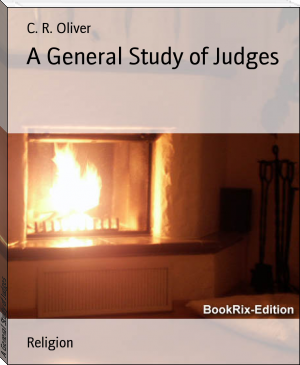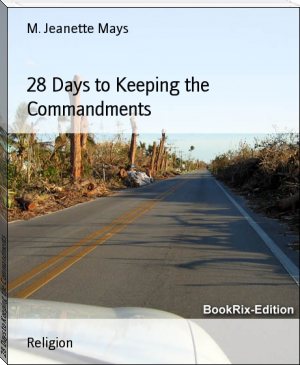TITHE OR HELL YOUR CHOICE - Mike Peralta (first ebook reader txt) 📗

- Author: Mike Peralta
Book online «TITHE OR HELL YOUR CHOICE - Mike Peralta (first ebook reader txt) 📗». Author Mike Peralta
In the section below I explain How to Receive the Baptism of the Holy Spirit.
How to Receive the Baptism in the Holy Spirit
Baptism in the Holy Spirit article by Kenneth Copeland.
When you receive Jesus Christ as Lord of your life, you become a new creature in Christ. But even after you become a new creation, God’s desire and plan is that you receive the Baptism in the Holy Spirit.
Your baptism in the Holy Spirit is received by faith. Jesus said in Luke 11:13, “If ye then, being evil, know how to give good gifts unto your children: how much more shall your heavenly Father give the Holy Spirit to them that ask him?” When you ask in faith, the Holy Spirit comes to live in you. And when you are filled with the Holy Spirit, as in the book of Acts, you speak in tongues.
Speaking in tongues is simply speaking in a language that only God understands -- even you won’t understand it. This happens as the Holy Spirit prays through you about things you may not know about or may not know how to pray about (Romans 8:26).
The Holy Spirit was sent to be our Helper. So when you pray in tongues, what actually happens is that the Holy Spirit searches your heart and prays through you the perfect will of God (Romans 8:26- 27). You actually utter the secret truths and hidden things which are not obvious to the understanding of your mind (I Corinthians 14:2, Amplified Version).
To pray in tongues, you need to realize that speaking with an unknown tongue is the voice of your heart. Speaking in a known tongue is the voice of the human mind (unless one of the vocal gifts, such as prophecy, of the nine gifts of the Spirit is in operation). The Holy Spirit of God will give you utterance, the same as your mind gives you thoughts to speak (Acts 2:4).
To speak in tongues, you must operate with the Holy Spirit. The Apostle Paul said in I Corinthians 14:14, “For if I pray in an [unknown] tongue, my spirit [by the Holy Spirit within me] prays, but my mind is unproductive…” (Amplified Version).
Notice that it was Paul who did the speaking. Ask the Holy Spirit to take charge of your tongue, then yield your tongue to His use. You cannot speak in your own language and tongues at the same time, just as you cannot speak with English and French at the same time. When your voice and tongue begin forming syllables around the expression that your heart desires to release, you will also speak in tongues. It will be your tongue, your breath, your vocal cords and you will be actively forming words. You will supply the sounds, but the Holy Spirit will supply the words - words unknown to you. It may seem awkward to you at first, but continue. Like a child learning to speak, you will grow.
Finally, as you seek the Baptism in the Holy Spirit, you need not wait to get a word from God about it - you already have His Word - nor do you need to wait around for the Spirit. The Spirit of God entered His ministry on the Day of Pentecost and He has been here ever since. He has never left!
Furthermore, you need not be concerned over being deceived and ending up with something that is from the devil. When you ask your heavenly Father for one of His promises - as the Baptism in the Holy Spirit - you can be confident the gift given is from God, not Satan.
Remember, Luke 11:13 says, “… how much more shall your heavenly Father give the Holy Spirit to them that ask Him?” So if you want to receive your baptism in the Holy Spirit, ask Him now.
“Heavenly Father, I am a believer. I am Your child and You are my Father. Jesus is my Lord. I believe with all my heart that Your Word is true.
“Your Word says if I will ask, I will receive the Holy Spirit. So in the Name of Jesus Christ, my Lord, I am asking You to fill me to overflowing with Your precious Holy Spirit. Jesus, baptize me in the Holy Spirit.
“Because of Your Word, I believe that I now receive and I thank You for it. I believe the Holy Spirit is within me and, by faith, I accept it.
“Now, Holy Spirit, rise up within me as I praise God. I fully expect to speak with other tongues, as You give me the utterance.”
Now begin giving sound to the expressions in your heart. Speak and hear the Holy Spirit speaking through you.
Rejoice! You’ve just been baptized in the Holy Spirit! You’ve been endued with power.
--- End of Baptism of the Holy Spirit Article ---
Keep practicing speaking in tongues and it will flow easier and easier as time goes on. And don’t forget to rebuke the devil because he will try to steal this new gift from you and tell you that you are just speaking gibberish. But you are not. You are speaking a very powerful heavenly language - which Jesus died to give to you.
Rejecting God’s Law Is Hostility To God
Paul casts additional light to the matter about grace and law in Romans 8:6-9. Paul contrasts the mind transformed by Christ with the mind still in darkness. He says, "the mind set on the flesh is death, but the mind set on the Spirit is life and peace" (Rom 8:6). Then he says, "For the mind set on the flesh is hostile toward God, for it does not subject itself to the law of God, for it is not even able to do so" (Rom 8:7). You can see how clear Paul is about the problem anyone has who "does not have the Spirit of Christ" (Rom 8:9). The problem is that this person is disobedient to God’s Law.
When Paul says "You are not under law but under grace" (Rom 6:14), he certainly does not mean that we have no obligation to keep God’s law.
In Romans 8:7,12; Paul holds that "the mind set on the flesh is hostile toward God because it does not subject itself to the law of God" and concludes, "Therefore brethren we are under obligation, not to live according to the flesh" (Rom 8:7,12). Together both statements, are saying (according to Paul) that being under grace involves being under an obligation to keep God’s law.
Titus 2:11-14; Paul tells Titus, "the grace of God has appeared, bringing salvation to all people, instructing us to deny ungodliness and worldly desires and to live sensibly, righteously, and godly in this present age... zealous for good works" (Titus 2:12,14). Paul, in his teaching, links the grace of God to the keeping of the law of Christ and the leading of an obedient life.
And what about God's grace. What is this exactly? Put simply, it is God’s unmerited and undeserved favor that we receive as the result of our Lord's redeeming sacrifice.
Jesus said, If we love Him, then we will keep His Commandments. John 14:15, “If you love Me, you will obey what I command.” So if we truly love our Lord and Savior then it will be our sincere desire to obey Him in everything He commands. Thus when we sin, repentance and to be sorrowful will be (or should be) an immediate response for breaking His law.
After repentance comes confessing our sin and asking for forgiveness, and a genuine desire and commitment to forsake the sin. 1 John 1:9 says, “If we confess our sins, he is faithful and just to forgive us our sins, and to cleanse us from all unrighteousness.” (And intrinsic in confession is agreeing with God to forsake the sin. Part of the word “confess” means to agree with.) This is where faith comes in. We believe by faith that the sacrifice of Christ cleanses us from all sin. Then comes the free gift from God. Ephesians 2:8-9 “For by grace are you saved through faith; and that not of yourselves: it is the gift of God: Not of works, lest any man should boast.” As a result of our repentance and faith, we receive God's Grace which is His unmerited favor (that we do not deserve) that we receive due to Christ interceding on our behalf as a result of His sacrifice. (1 Timothy 2:5) This also shows that if there was no law, there would be no need for God's Grace. If there is Grace then there is His law to be obeyed. There is however no sacrifice that will cover willfull and un-repented sin. (Hebrews 10:26-29) (Also see my book: Backsliding To Hell by Mike Peralta where this is thoroughly explained.) However, if one sincerely repents later in time then he will be forgiven as God promises in 1 John 1:9. Christ will forgive those who come to true repentance.
Consider the following. Can a murderer sentenced to death work for his freedom? No, because he is under the law and the law demands the death penalty. The only way he can be set free is if the Governor gives him a pardon. So in waiting for the execution this man would truly be under the law in every sense of the word; under the guilt, under the condemnation and under the sentence of death. Just before the execution date the governor reviews the condemned man's case and decides to pardon him. In the light of extenuating circumstances the governor exercises his prerogative and sends a full pardon to the prisoner. Now the prisoner is no longer under the law but under grace. That is, the law no longer condemns him. He is considered totally justified as far as the charges of the law are concerned and he is free to walk out of the prison and no policeman can stop him.
But now that he is under grace and not law, can we say that he is free to break the law? Of course not! In fact he would now be doubly obligated to obey the law because he has found Grace from the governor. In gratitude and love he will be (or should be) very careful to honor and obey the law of that state which granted him grace.
Likewise, under the law we justly will go to Hell forever as a just consequence of our sin. However, if we receive the pardon of our sins by repenting and receiving Jesus as the sacrifice for our sins then we are pardoned and so are now under grace.
Now what did Paul say about sin and grace? Romans 6:1-2, “What shall we say then? Shall we continue in sin, that grace may abound? God forbid. How shall we, that are dead to sin, live any longer therein?” And for further clarity using the main passage about avoiding sin, in loving obedience to God. Romans 6:14-15, “For sin shall not have dominion over you: for ye are not under the law, but under grace. What then shall we sin, because we are not under the law, but under grace? God forbid.”
The Bible does say that we are not under the law, but does that imply that we are free from the obligation to obey the law? How easily we could prevent confusion (actually rebellion) if we just accepted exactly what the Bible says. After stating that we are not under the law but under





Comments (0)